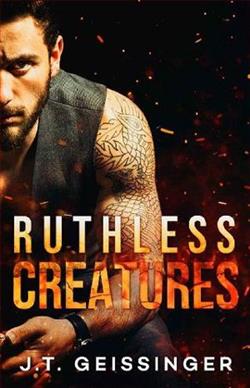Page 4 of Rapture's Edge (Night Prowler 3)
Luckily for Édoard, the urge wasn’t completely overwhelming.
With the steely control of a man who’d once stabbed a rival to death with his platinum Mont Blanc pen and hours later used the same pen to sign his name with a flourish on a check with six zeroes at the mayor’s annual charity ball, Gregor mused, “Did you know that hydrofluoric acid is one of the only things that can completely decompose human bone? It can also dissolve glass, it’s so corrosive. Even if as little as a few inches of your skin come into contact with it, you’ll die within hours. Reacts with the calcium in your body, causes systemic toxicity and tissue death. It’s untraceable, too.”
Édoard’s bland smile died a quick, ugly death. He sputtered, “Are you…are you threatening me?”
“What?” Gregor blinked, feigning innocence. “Sorry, I was just thinking about this thing I watched on TV last night. Amazing what you can learn from those crime shows.”
From behind Édoard came a low, amused chuckle. Gregor glanced at the man in the black suit and found him smiling, a flat slash across his face that did nothing to warm the frozen intensity in his gaze. With those sly, vulpine eyes and the clouds of smoke billowing around him, the man was reminding Gregor more and more of an ice serpent conjured from some glacial version of hell.
Édoard sprang from the chair. “Have it your way,” he snapped. “I’ll be back in the morning with a warrant. Plan on spending all day here. We’re going to need access to all your files.”
Muttering oaths, he jerked his head toward the door and turned. The two gendarmes followed on his heels. “Agent Doe!” he barked over his shoulder, then he stepped through the door and vanished.
The man in black rose from the couch with quiet, confident economy. He took one last drag from the cigarette and then dropped it to the handwoven Turkish rug beneath his feet. With the toe of his gleaming black oxford, he unapologetically ground it into the thick pile. He clasped his hands behind his back and regarded Gregor with those chilling blue eyes. When he spoke, his voice was a perfect complement to that look—cold and lifeless, with a pronounced German accent that could make even the most lighthearted child’s song sound like a funeral dirge.
“French cigarettes are as feeble as everything else in this country.”
Gregor leaned back into his chair and gazed at the inscrutable Agent Doe. “Including the police.”
“Ha. How right you are,” quipped Doe without an ounce of affront. He walked to the door, unhurried, his hands still clasped behind his back.
“You’re not one of Édoard’s, then,” said Gregor. “But he called you ‘agent.’ You’re with the government?”
Doe reached the doorway and paused. “I am with the government in the exact same way that you are a legitimate businessman.”
This statement bothered Gregor. The way he pronounced with the as wit zuh bothered him. Everything about the man bothered Gregor. Like a physical itch on his skin, he felt the intense, irritating need to know exactly who this man was and what he was up to. “Doe is an unusual name for a German,” he persisted. “What’s your first name?”
The agent gave him another of those dead smiles. He stepped over the doorway threshold and said, “John.” He disappeared through the door and swung it shut behind him. It closed with a thud that faintly shuddered the row of floor-to-ceiling windows.
John Doe?
From behind him a voice said, “Watch out for that one. He’ll skin you alive and make a lampshade out of your hide if he gets the chance.”
Gregor smiled but didn’t turn. He wanted to savor the moment.
He remembered the very first time he’d heard that silken purr of a voice. It was three years ago. He’d been at Bulgari with his son Sean and his son’s pneumatic bimbo-of-the-week Nicollette, shopping for a Christmas gift for his now blind, elderly mother he’d installed in a big house he’d bought for her in Monaco, when his idiot offspring had thought it a capital idea to try and steal a ten-thousand-euro watch as a Christmas gift for himself.
Try being the operative word. It was a clumsy attempt, at best, and a gargantuan security guard had him by the collar before he’d made it ten steps.
Like his father, Sean had been in trouble with the law since he was a child but had none of his father’s intelligence or ability to learn from mistakes and devise new, better ways of operating outside the confines of the legal system. He was a petty thief, a dumb one at that, and had it not been for the intervention of an angel he’d still be rotting in jail to this day.
Gregor didn’t know exactly how she’d managed it; he didn’t know because she wouldn’t tell him, and though he’d mulled it for years he’d never solved the riddle. The only thing of which he was certain was seeing with his own disbelieving eyes when his son palmed the watch and slid it in his coat pocket as Nicollette distracted the salesgirl from the selection on the white velvet tray. Then he turned and began to walk toward the door. Then the security guard nabbed him, wrestled him to the floor, and searched him while Sean lay silently still, tears rolling down his red cheeks.
But there was no watch.
It wasn’t in his pocket or anywhere on his person, and in the end the guard was forced to let him go. The evidence had disappeared into thin air.
They were all back in the limo, just about to pull away from the curb outside the store, when he heard a light tap on the tinted window. Gregor pushed the armrest button, and it slid silently down, revealing in degrees the most astonishing face he’d ever seen, peering in.
Wide-set eyes of blackest night, canted up at the corners like a cat’s. Thick, shoulder-length hair chopped rough and dyed indigo blue by someone who obviously hated her. Skin the color and creamy consistency of café au lait. A delicate nose and a wide, intelligent forehead and lips almost outrageously full that brought to mind certain body parts he?
?d like to have them wrapped around.
Gregor didn’t think she could accurately be called beautiful—she was too exotic, too many planes and angles in features that were proportionate but atypical—but he knew without doubt he’d never seen anything remotely comparable. He felt like he was a Neanderthal gazing at a Salvador Dali painting; he had no frame of reference and didn’t quite understand it, but he recognized the genius nonetheless.
For the first time in his life, he almost believed in the existence of God.
His surrealist masterpiece said, “I think this belongs to you.” She lifted her hand, and from one tapered finger dangled the gold and diamond watch Sean had taken. It glinted with mocking cheer in the afternoon sun.















